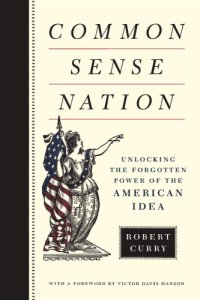
Ebook: Common sense nation: unlocking the forgotten power of the American idea
Author: Curry Robert
- Tags: Founding Fathers of the United States, HISTORY--United States--Revolutionary Period (1775-1800), PHILOSOPHY--Political, POLITICAL SCIENCE--Government--National, Politics and government, United States. -- Declaration of Independence, United States. -- Constitution, Constitution (United States), Declaration of Independence (United States), United States -- Politics and government -- Philosophy, HISTORY -- United States -- Revolutionary Period (1775-1800), PHILOSOPHY -- Political, POLITICAL SCIENCE -- Governme
- Year: 2015
- Publisher: Encounter Books
- City: United States
- Edition: First American edition
- Language: English
- pdf
"We hold these Truths to be self-evident, that all men are created equal, that they are endowed by their Creator with certain unalienable Rights, that among these are Life, Liberty and the pursuit of Happiness." We have heard and read this sentence all our lives. It is perfectly familiar. But if we pause long enough to ask ourselves why Jefferson wrote it in exactly this way, questions quickly arise. Jefferson chose to use rather special and very precise terms. He did not simply claim that we have these rights; he claimed they are unalienable. Why "unalienable"? Unalienable, of course, means not alienable. Why was the distinction between alienable and unalienable rights so important to the Founders that it made its way into the Declaration? For that matter, where did it come from? You might almost get the impression that the Founders' examination of our rights had focused on alienable versus unalienable rights-and you would be correct. In addition, the Declaration does not simply claim that these are truths; it claims they are self-evident truths. Why "self-evident"? The Declaration's special claim about its truths, it turns out, is the result of those same deliberations as a result of which, in the words of George Washington, "the rights of mankind were better understood and more clearly defined than at any former period." If a friendly visitor from another country sat you down and asked you with sincere interest why the Declaration highlights these very special terms, could you answer them clearly and accurately and with confidence? Would you like to be able to? --;Locke's revolution -- The founders -- The American enlightenment -- The Declaration of Independence -- The Constitution -- The Federalist Papers -- Religion and the American enlightenment -- Turning away from the founders -- Common sense nation -- A brief history of "liberalism" -- How to misunderstand the founders.
Download the book Common sense nation: unlocking the forgotten power of the American idea for free or read online
Continue reading on any device:

Last viewed books
Related books
{related-news}
Comments (0)